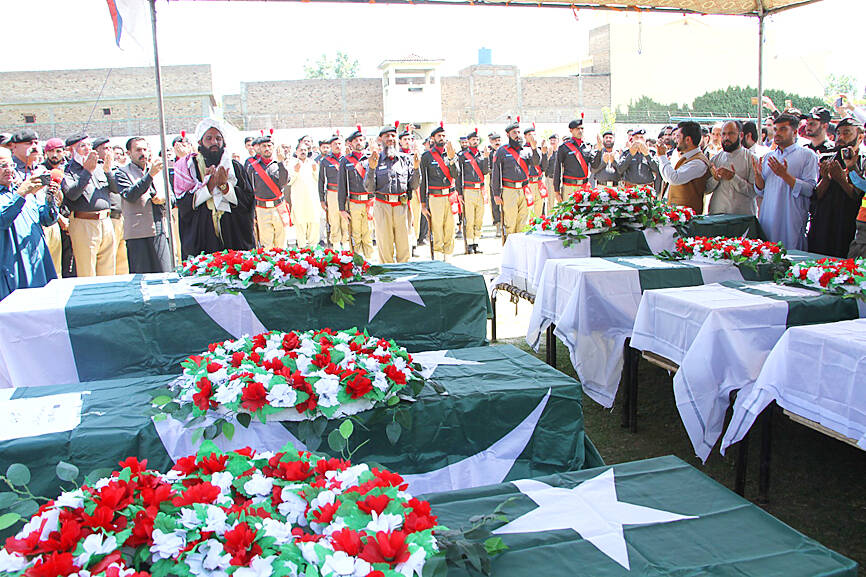The death toll from a series of explosions caused by a fire in a munitions cache in a Pakistan police station rose to 16, police said yesterday.
The explosions leveled the specialist counterterrorism station in Kabal in the Swat Valley, in the northwestern region of Khyber Pakhtunkhwa which neighbors Afghanistan.
Swat police said a short-circuit in a basement storing “grenades and other explosives” was the cause of the blasts.

Photo: EPA-EFE
“It was like hell let loose on me,” said Abbas Khan, 21, who had parked his car near the police station.
He said a thick cloud of dust and smoke engulfed the entire area, making it difficult to breathe.
The dead included police officers, five suspected terrorists being held for interrogation, and two brothers aged four and six who lived nearby, Khyber Pakhtunkhwa Police Inspector General Akhtar Hayat Gandapur said.
More than 50 people were being treated at various hospitals for their wounds.
Gandapur ruled out the possibility of any terrorist activity.
“We have not yet found any material or visual evidence suggesting a suicide attack, but we will look into all aspects during investigations,” he said.
The intense explosion rained pieces of munition on nearby houses and streets.
“Three hundred kilograms of explosives, including anti-tank and anti-personnel mines, artillery shells and mortars were stored in the basement in addition to improvised explosive devices and suicide vests, which had been recovered from the custody of terrorists,” said Khalid Sohail, a senior officer in the local counterterrorism department.
Funeral prayers for nine police officers were offered yesterday morning, with their coffins draped in the national flag.
Since the start of the year, two attacks on large police bases have been linked to the Pakistani Taliban, known as Tehreek-e-Taliban Pakistan (TTP).
The TTP have long targeted law enforcement officials, who they accuse of conducting extrajudicial executions.
Pakistan has witnessed a dramatic uptick in attacks since the Taliban seized control of Kabul, focused on its border regions with Afghanistan, and Islamabad says offensives are being launched from Afghan soil.

Seven people sustained mostly minor injuries in an airplane fire in South Korea, authorities said yesterday, with local media suggesting the blaze might have been caused by a portable battery stored in the overhead bin. The Air Busan plane, an Airbus A321, was set to fly to Hong Kong from Gimhae International Airport in southeastern Busan, but caught fire in the rear section on Tuesday night, the South Korean Ministry of Land, Infrastructure and Transport said. A total of 169 passengers and seven flight attendants and staff were evacuated down inflatable slides, it said. Authorities initially reported three injuries, but revised the number

A colossal explosion in the sky, unleashing energy hundreds of times greater than the Hiroshima bomb. A blinding flash nearly as bright as the sun. Shockwaves powerful enough to flatten everything for miles. It might sound apocalyptic, but a newly detected asteroid nearly the size of a football field now has a greater than 1 percent chance of colliding with Earth in about eight years. Such an impact has the potential for city-level devastation, depending on where it strikes. Scientists are not panicking yet, but they are watching closely. “At this point, it’s: ‘Let’s pay a lot of attention, let’s

‘BALD-FACED LIE’: The woman is accused of administering non-prescribed drugs to the one-year-old and filmed the toddler’s distress to solicit donations online A social media influencer accused of filming the torture of her baby to gain money allegedly manufactured symptoms causing the toddler to have brain surgery, a magistrate has heard. The 34-year-old Queensland woman is charged with torturing an infant and posting videos of the little girl online to build a social media following and solicit donations. A decision on her bail application in a Brisbane court was yesterday postponed after the magistrate opted to take more time before making a decision in an effort “not to be overwhelmed” by the nature of allegations “so offensive to right-thinking people.” The Sunshine Coast woman —

CHEER ON: Students were greeted by citizens who honked their car horns or offered them food and drinks, while taxi drivers said they would give marchers a lift home Hundreds of students protesting graft they blame for 15 deaths in a building collapse on Friday marched through Serbia to the northern city of Novi Sad, where they plan to block three Danube River bridges this weekend. They received a hero’s welcome from fellow students and thousands of local residents in Novi Said after arriving on foot in their two-day, 80km journey from Belgrade. A small red carpet was placed on one of the bridges across the Danube that the students crossed as they entered the city. The bridge blockade planned for yesterday is to mark three months since a huge concrete construction